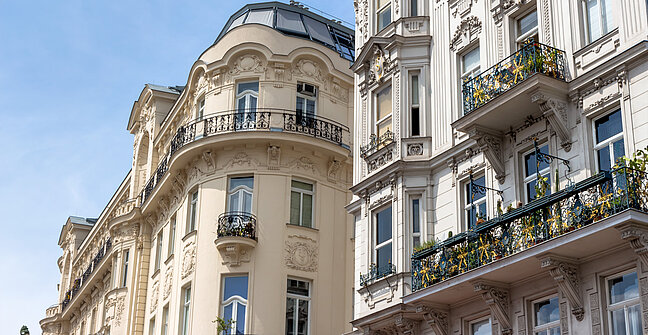
Renting – The Details
In this chapter you will find important information to consider if you would like to rent a property in Austria. We will provide an overview of the legal aspects of renting, points to be aware of in the rental agreement as well as an overview of important safety checks that the tenant is obliged to carry out.
Any EU/EEA (European Economic Area) or Swiss citizen, or third-country national may rent an apartment in Austria under the same conditions as an Austrian citizen.
Tips for Renting an Apartment
Deciding which apartment is right for you can be overwhelming.
There are so many factors to consider. Here are some useful tips for your apartment search:
- Set your priorities realistically and stick to them.
- Get a second opinion. Ask friends, relatives or work colleagues to check the property advert or view the flat with you.
- Spend some time in the neighbourhood. Take a look at the local supermarket, bakery or farmers' market. Go to a local café and chat with the locals.
- Even better: Try to get in touch with the previous tenants or other residents of the building.
- Make sure that the basic rent is calculated correctly in accordance with the law (there are various free advice centres for this, e.g. Chamber of Labour).
- How difficult will it be to move in? If necessary, obtain a rough cost estimate from a moving company.
- Some rental agreements have a limited term, which means that you may have to move out at the end of the term.
- Seek legal advice when concluding your rental agreement. There are also various (free) advice centres for this.
Further Information on Renting Property
Further information on tenant assistance.
Further information on housing, authorities and advice centres.
Signing the Rental Offer - Mietanbot
Once you’ve decided that an available apartment meets your needs, budget, and preferences, you will be asked by the landlord (often via an estate agent or property manager) to sign a rental offer (Mietanbot). Such an offer is legally binding once it’s signed by you, so you must be absolutely sure that you’re satisfied with the terms and conditions.
Under certain circumstances it is possible to withdraw from the rental offer free of charge (§30a Consumer Protection Act):
- If you viewed the apartment for the first time on the same day as the rental offer was signed
- If the property was intended to be occupied by you or a relative as your main residence
If no information was provided about the right of withdrawal, this period shall be extended by a total of one month. Never sign two rental offers just to reserve one or the other because you might end up with two apartments at the same time.
Under no circumstances should you pay a deposit or monthly rental payment before the actual lease is signed. Typically this is paid in cash upon signing the rental agreement.
The Rental Agreement
We strongly recommend having a written rental agreement signed by both parties. A rental is only valid as long as both parties mutually agree on the terms and conditions in writing.
For a rental agreement to be concluded, it is sufficient for both parties to agree on the property to be rented and the rent itself. If you submit a legally-binding rental offer that contains these two points and the landlord/landlady accepts this offer, a contract has already been concluded! This means that the landlord and tenant are bound by the contract and withdrawal without cause is no longer permitted (see Time to make an offer - MietanbotTime to make an offer - Mietanbot ()).
Some apartments are offered partially furnished, which has to be stipulated in the rental agreement. Appliances such as dishwashers, refrigerators or washing machines are not uncommon as part of a rental agreement. However, in some cases you can also negotiate a price with the previous tenant and buy the appliances (“Ablöse”).

Further Information on the Rental Agreement
You can find out what a rental agreement should contain the following guide (in German only).
Find more information in English on the Austrian Landlord and Tenant Act here.
Unless included in the rental agreement itself, the following elements should be listed and checked during the handover of the apartment.
Apartment-Checklist – Inventory
Landlord’s Rights and Responsibilities
- To hand over and maintain an apartment in usable condition (i.e., must remedy serious damage to the building and remove significant threats to the health of its occupants).
- To maintain the common areas and amenities of the building (including the apartment’s entry door, outer windows and balconies), as well as the heating appliances and boilers within the apartment.
- To provide trash removal and pest control services in the building.
- To repair faulty water pipes, gas pipes, electric wiring.
- To repair building damage caused by moisture (e.g., mould buildup and rotting walls).
- To ensure the chimneys are swept. If the lease falls under MRG regulations, the costs of such maintenance are covered by the tenant.
- Not to disturb the tenant and to give advance notice by telephone or email if the landlord wishes to enter the flat. This obligation to notify the tenant does not apply in emergencies.

Tenancy Act (MRG)
The Austrian Tenancy Act (MRG) regulates the rights and obligations of tenants and landlords.
It applies to tenancy agreements for flats and business premises, but not to all tenancy agreements - for example, single-family homes, holiday flats or certain new buildings (built after 1953) are partially or completely exempt. Accordingly, a distinction is made between full application, partial application and non-application of the MRG. Two key criteria for the full application of the MRG are that the building in which the rented flat is located was built before 1 July 1953 and that it contains more than two rental properties.
The MRG is particularly dedicated to the protection of tenants, e.g. through rent caps, protection against eviction and the clear regulation of the contents of rental agreements. It is therefore best to find out whether and to what extent the MRG is applicable to your tenancy before signing the rental agreement.
Further Information
Further information on the MRG and other relevant laws.


